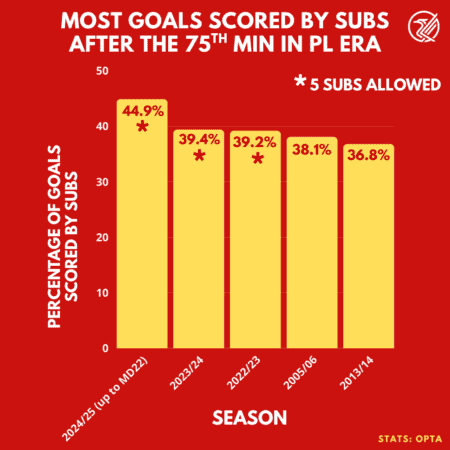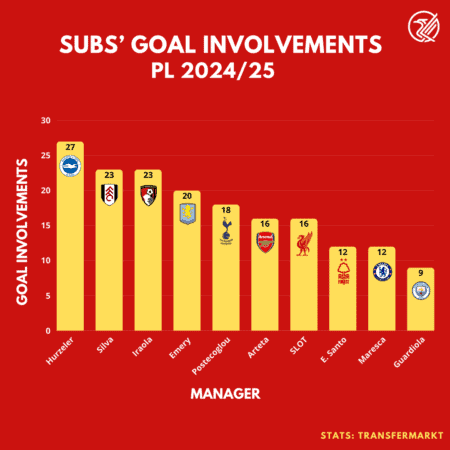As Hugo Ekitike stood before the Kop, adrenaline coursing through his veins while brandishing his shirt to the adoring fans, the message was clear, ‘I am here. I am a star’.
No one who adopts a Lionel Messi move is short on self-confidence, and Ekitike has already built the body of work to justify it. Five goals in his first seven appearances has crowned the best start of all of this season’s new recruits – the only one with their own chant.
Despite all of the noise around his more celebrated striking colleague Alexander Isak, it has been Ekitike who has fitted into the Liverpool attack like a glove and become the deadly tip of the spear.
And yet, even now, the expectation remains that he will have to get used to life as a substitute once Isak is up to speed after a summer of stasis.
No need to worry, Hugo

The good news for Ekitike is that a place on the bench is no longer a place in the wilderness. In the modern game, there’s a strong argument to be made that it’s barely a demotion.
With more and more games being decided in the final stages, the players that end the game are increasingly as important as those who start it.
In the era when each manager can introduce five subs from a choice of nine, with squads packed full of internationals and teams at the top regularly paying upwards of £40 million for a player who won’t be first choice, having a strong group of ‘finishers’ no longer refers merely to players who can find the net with ease.

Arsenal manager Mikel Arteta has been vocal on the subject in recent weeks, insisting that his squad depth will more often than not make the difference between winning and not winning.
“The finishers are going to be more important this season sometimes than the starters,” Arteta claimed.
“We can change the game there, especially with the intensity that we play and teams start to drop off. I’m very pleased to see that.”
Arne Slot’s ‘finishers’

Liverpool are no strangers to the benefits of bench players. From David Fairclough to Divock Origi, many substitutes have written their name into Anfield folklore.
Arne Slot’s champions were only joint-seventh for Premier League goals from substitutes, but those seven goals by Diogo Jota, Darwin Nunez, Luis Diaz and Trent Alexander-Arnold were worth eight points – significant in a championship that was decided by 10 points.
That trend has continued this term, with Ekitike becoming the third man to decide a contest from the bench, following Federico Chiesa and Rio Ngumoha in the opening two games of the campaign.

Arteta loves that Rugby Union refers to players as finishers, but its roots are deep within American sport. In baseball, a team’s closer is the pitcher who comes in to secure a victory, while in basketball, the strength of your death lineup is crucial, especially in the playoffs.
Coached by Steve Kerr, Golden State Warriors’ Andre Iguodala became the 2015 NBA Finals MVP despite starting on the bench for the first three games of the series and the entire 82-game regular season.
Kerr is a Liverpool fan and a keen student of Jurgen Klopp, though the German may have taken a leaf out of Kerr’s playbook with his use of James Milner.
Follow James Milner’s example

The arrivals of Fabinho and Naby Keita in the summer of 2018 saw Milner starting fewer games – a situation that he was far from happy with. Having left Man City in search of more starts, he could be forgiven for thinking that he would need to move on once again.
Thankfully, Klopp was smart enough to convince Milner of the importance of his new role, using his intelligence and experience to help his side see out tight games.
Nowhere was this more apparent than the 2019 Champions League final against Tottenham.
Having started 10 of the 12 previous European games, there was no doubt that he would have been livid to miss out in the big one, but his 28 minutes were vital in shepherding the team over the line as pressure grew late on.
Slot has employed similar tactics with another midfielder north of 30 years old, Wataru Endo.

The Japan captain saw his minutes shrink considerably last season, but rather than sulk he has embraced his role with gusto to the point that seeing him slap in his gumshield as the clock ticks beyond 80 minutes has become a comfort blanket for Liverpool fans at the end of close games.
Slot acknowledges the qualities it takes to perform such a role: “I appreciate him a lot as a football player but also as a human being because no matter how many minutes the team needs him [for], he always shows up.
“‘Wherever you play me, I will do my best.’
“If it is five minutes before the end, he comes in and gives everything. I have seen other players during my career come on at the end of matches and show a different attitude.”
The hope will be that Endo’s approach will rub off on Ekitike, but luckily for the head coach, there are many from whom the young Frenchman can learn this lesson. Chiesa, Joe Gomez and vice-captain Andy Robertson, all full internationals who are keenly aware that, as it stands, they don’t feature in Liverpool’s strongest XI.

They have all been able to put their disappointment aside and excel when called upon.
Chiesa’s cameo won the game with Bournemouth, Gomez was excellent when required to replace Ibrahima Konate against Arsenal, while Robertson steadied the ship after Milos Kerkez had to be sacrificed at Burnley.
Liverpool will play enough games for Ekitike to start plenty of matches this season, and he will be given the opportunity to make himself undroppable. There is also still the prospect of starting alongside Isak, from the left in place of Cody Gakpo.
Nonetheless, when he does find himself on the bench, he should remember that in modern football it’s not how you start but how you finish that matters.

